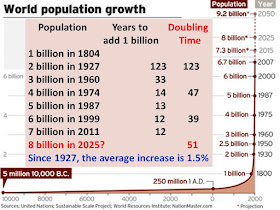Over the past 20 years, I have seen innumerable reports about climate change, loss of bio-diversity, plastic pollution, atmospheric & river pollution, ocean acidification, desertification, migration crisis, consequences of sea-level rise and many other issues. There has been no shortage of conferences, governmental level meetings, scenario-playing __ a bonanza for talking shops, kicking the can down the road and an excuse for not doing much until the next big meeting.
Until the end of the 20th century, North America and Europe were the biggest consumer of global resources and the impact was already visible. Now a four times bigger population block from Asia has joined the consumption bonanza using up natural resources at a much faster rate.
Not much else has changed since 2012 when I gave an extensive course on sustainability in Glasgow - the issues are still the same - just the time frame in which to act to 'Save the Earth' is getting vanishingly small. I am publishing my updated lecture on Population Dynamics in the following. Other lectures and updates may be reached here ( Energy Resources, Food and Water Resources, Climate Change, How to Feed 10 Billion People, Future Water Crises).
The talk on population dynamics is presented below:
Sustainability - Population
Dynamics –
What sort of world shall I
inherit, daddy?
(The talks were given in September
2012 in Glasgow)
Population control is a sensitive
topic and generates extreme emotional response in people - partly due to the way most religions
favour unfettered reproduction. This was fine when we were talking about
a handful of humans on the Earth but now the problem of overpopulation and
hence over-consumption must not be ignored.
But this is what every body -
well almost every body - does.
When
searching for solutions, it is usual to say that the Earth is under stress and
somehow the humans will be able to find a way to save Mother Earth.
This is delusional thinking.
Humans are the problem - they are the 'cancer' that is eating away the
fabric of the earth and a day will come when the earth will simply remove the irritant
and carry on as it has for the last 4.3 billion years.
(please click on a slide to see its full page-view - navigate with left/right arrow) It might appear that there is some hope of population stabilising at about 10 billion mark sometimes after 2050. The difficulty arises with consumption and exploitation of Earth's resources. For example, Standard of livings are improving and meat consumption is increasing - particularly in China and other emerging economies. The number of livestock has increased in response for meat products.
Since 1960, in 50 years, the number of chicken has gone up by 300% to 12 billion in 2010, cattle numbers by 30% to 1.4 billion, pigs by 250% to 1 billion and sheep and goats by 50% to 1.8 billion.
These animals require land, water, food - exactly what humans need to live. This is an additional burden on the Earth's resources and is necessary because humans love to eat animal meat. Many studies have suggested that switching to a plant based diet will help the environment/ecosystem enormously but, due to commercial pressures, no goverment is keen to openly come out in favour of such a transition.
Technology can help in this regards and I have discussed this in my talks referred to earlier. However, it is moot point as to how long the earth carry the extra burden of us humans before a tipping point reaches and our civilization as we know collapses.
Just wish to mention the crazy notion of some eminent people that somehow, when the earth becemes too crowded and polluted, we can colonize othe planets and heavenly bodies in space. This is th e familiar Elephant in the Room scenario when a probelm is ignored and is allowed to get out of hand by irresponsible policy decisions. I have discussed the matter of 'hype about space colonization' here.


































No comments:
Post a Comment